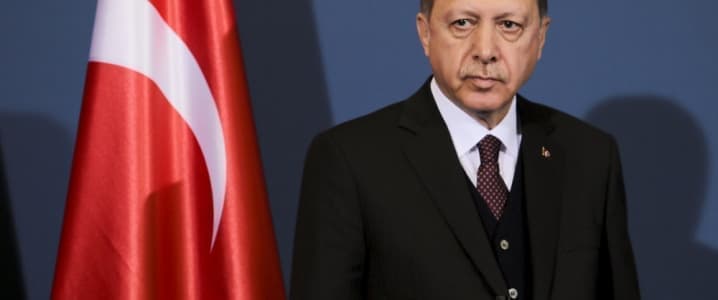The Middle East is the world’s most dynamic and important energy market. Geopolitical interests, economics, and security concerns are continuously influencing the parameters according to which countries interact and compete in the region. While there are plenty of signs of a desire for cooperation and interdependence throughout the Middle East, turning these desires into reality is always a difficult task.
Iraq is a prime example of an influential energy-producing state in the region that has been transformed by external influences. The country’s invasion by U.S. troops in 2003 was the most important event in the region since the Islamic Revolution of 1979 in Iran which completely altered the geopolitical landscape. Regime change and the disastrous nation-building policy of the U.S. led to the complete implosion of the Iraqi state, which was an opportunity for neighbors to exert influence. Remarkably, Iran has benefitted most from a weakened Iraq, but Turkey is not far behind when it comes to establishing fruitful relations with both the Central Government and the Kurdish Regional Government, KRG, in Northern Iraq.
Despite Ankara’s fear of Kurdish autonomy reinvigorating calls for independence in its restive provinces, Turkey’s relations with the KRG in Erbil have been remarkably successful over the past two decades. The parties have agreed to establish mutually beneficial business endeavors such as an agreement to export oil in 2012 through an overland pipeline to the port city of Ceyhan. The deal hampered the KRG’s relations with the Central government in Bagdad which, at the time, was unable to establish control over the north. Related: Russia Aims To Ditch The Dollar For Oil & Gas Sales

In recent times, however, Iraq’s internal political balance has changed considerably. Before the 2017 referendum for Kurdish independence, the KRG had the upper hand when dealing with Bagdad. However, the Kurds miscalculated their support amongst Western allies, predominantly the U.S., which led to the reestablishing of control by Iraqi militias and the Central Government over areas liberated from ISIS.
Due to these developments, Ankara is now turning towards Bagdad for new energy deals. Recently, the two governments announced that they were looking into the option to construct a second pipeline that could more than double existing export capacity. Although the existing pipeline is still partly working, it has repeatedly been damaged by the PKK. Also, ISIS caused significant damages to the infrastructure when it controlled the area in 2014.
Bagdad intends to maintain firm control over its northern region to prevent Kurdish independence. The new pipeline, therefore, would create an alternative route for Iraqi oil exports. Additionally, the new line would also connect to infrastructure in Central and Southern Iraq. This would improve the country’s energy security as oil exports can be diverted towards the north in case the Strait of Hormuz is choked off.
On the other hand, Russia has been lobbying with the Iraqi government to prioritize an alternative option. Bagdad is also looking into reviving the old pipeline to Jordan and Lebanon through Syria. Security concerns, however, have impeded quick progress.
Despite the hopeful and business-oriented signals coming from Ankara and Bagdad, it remains highly unlikely whether a multi-billion pipeline will be constructed. The inflexibility of fixed assets and massive investments require a certain level of political stability between parties to provide financial certainty. Relations between Iraq and Turkey, historically, have been far from stable. Related: Is This The Next $170 Billion Energy Industry In The US?
The two countries have a range of disagreements and looming conflicts. In 2016 Turkish troops invaded Northern Iraq to defeat ISIS and establish a foothold against the PKK, an action that was strongly criticized by Bagdad. Also, Turkey and Iraq disagree over the sharing of water resources that originate in Anatolia. Ankara will start filling several large water reservoirs behind newly constructed dams that will limit the Iraqi share for several years. The easing of tensions in these areas is as important for the feasibility of the new pipeline as profitability.
Another critical development is Turkey's recent invasion of Northern Syria after the surprise withdrawal of U.S. troops. Turkish President Erdogan has been successful in what many analysts deemed as impossible: uniting the Middle East to condemn the attack. According to the International Crisis Group, the military operation will lead to "significant civilian casualties, displace many inhabitants and fuel local insurgency" in case of hostilities advancing into densely populated areas.
The precarious status quo has been violated by Turkey. Also, other disagreements between Turkey and Iraq will act as significant hurdles to the realization of new projects. It is more likely that the countries won’t complete technical and financial feasibility studies until the situation stabilizes. Until then, the pipeline will remain nothing more than a signal of good intentions concerning cooperation and interdependence in the region.
ADVERTISEMENT
By Vanand Meliksetian for Oilprice.com
More Top Reads From Oilprice.com:
- EIA Sharply Cuts Oil Price Forecast
- Trump’s Big Biofuel Package Has No Teeth
- The World’s Largest Oil Company Fights To Save Gasoline Engines


















